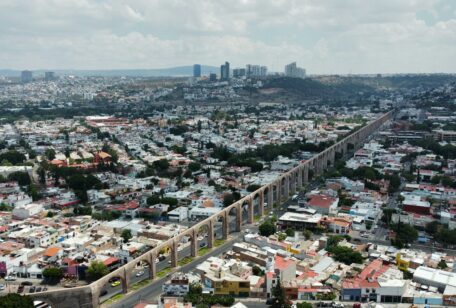
Enrique Ortegon
What is an International Fiber Crossing?
An International Fiber Crossing (IFC) is a physical infrastructure that connects telecommunications networks between two countries via high-capacity fiber optic cables. Along the Mexico–U.S. border, these crossings allow data to travel directly between both nations without unnecessary detours or additional handoffs, which are often points of latency or risk.
This infrastructure supports faster and more direct connections, helping reduce latency, optimize performance, and provide better control over how data flows. For businesses, governments, and carriers on both sides of the border, IFCs enable more predictable, secure, and resilient digital operations.
Strategic Routes That Shape Cross-Border Performance
Strategic fiber crossings shape the future of Mexico–U.S. connectivity. MDC Data Centers has developed IFCs at crucial gateways such as San Diego, Eagle Pass, Laredo, McAllen, El Paso, and Nogales, enabling interconnection with major U.S. hubs like Dallas, Los Angeles, and Phoenix, and with cities in Mexico such as Monterrey, Querétaro, and potentially Mexico City.
These routes improve network performance and reliability. While IFCs offer multiple paths at the border level, MDC specifically reduces single points of failure at the crossing itself. Beyond the crossing, overall path redundancy depends on the broader network architecture implemented by local and national network operators.
One example is San Diego, where MDC has deployed two International Fiber Crossings—one in San Ysidro and another in Otay Mesa—which together offer diverse direct access to Mexican networks from California. This kind of connectivity strengthens cross-border digital collaboration for industries like finance, logistics, content and cloud services, among others.
Redundancy Built for Resilience
In today’s digital economy, redundancy is no longer optional. International Fiber Crossings offer alternative routes for critical traffic—but only if properly configured.
For instance, if a company in Mexico relies on cloud infrastructure hosted in the U.S. and its primary connection goes down, traffic can only be rerouted through a different crossing if redundancy has been properly configured by the network operator or client. MDC enables diverse path options in most of the crossings at the border, which allows network operators to configure redundant routes to protect the traffic automatically in case of fiber failures.
This level of built-in flexibility is vital for sectors such as healthcare, finance, government, and media. IFCs provide the framework that enables operators to enhance resilience in a connected environment—it’s the broader network design that determines failover success.
Government Compliance and Public Contract Requirements
IFCs play a vital role in meeting strict regulatory standards—particularly in sectors where compliance is not optional. This includes industries working with government contracts or operating under regulated environments.
In the U.S., the Federal Communications Commission (FCC) enforces stringent requirements for international fiber infrastructure, such as licensing, audits, and security standards. In Mexico, government programs continue expanding fiber deployment along the border to stimulate economic growth, address the digital divide, and enhance national cybersecurity.
By helping companies meet legal and technical obligations, IFCs are critical to both public-sector contracts and private-sector compliance—especially for industries like finance, hyperscalers, and multinational enterprises. This role is even more important when considering that interconnectivity between countries must also comply with binational frameworks. MDC ensures compliance and performance across its cross-border crossings.
Enabling Digital Growth and Regional Development
IFCs are more than infrastructure; they are catalysts for economic and digital advancement. By enabling reliable cross-border connections, IFCs directly support cloud services, smart city initiatives, fintech innovation, and digital transformation strategies.
Querétaro in particular is emerging as a major interconnection hub for Mexico and LATAM. With strong outbound fiber infrastructure, it is rapidly becoming a strategic origin point for new international fiber routes headed to the U.S. This positions Querétaro as a key player in attracting foreign investment, data center expansion, and technology ecosystem growth that require connectivity to U.S. networks via IFCs.
From education to healthcare to e-commerce, better connectivity allows organizations to collaborate, innovate, and scale efficiently.
MDC’s Integrated Approach
MDC Data Centers offers more than just colocation services. Its value lies in an integrated approach that combines IFCs, colocation services, diverse ecosystems, interconnection opportunities, and operational support. These elements come together in MDC’s BorderConnect Platform™, which unifies cross-border connectivity into a single, streamlined experience.
By eliminating the need for multiple vendors at the international fiber crossing segment, MDC’s model simplifies infrastructure management for that portion of the route. Clients are still responsible for connectivity at the origin and destination ends of their overall solution. This setup supports growth for Network Operators, Content Providers, ISPs, and Enterprises.
Building the Digital Border
Data is the new oil — and International Fiber Crossings are a crucial part of the infrastructure that enables secure, modern communication between Mexico and the U.S. These crossings support cross-border relationships in measurable ways, powering innovation, economic growth, and digital transformation.
Companies like MDC Data Centers are not simply delivering fiber. They offer an integrated value proposition that includes colocation services, a diverse interconnection ecosystem, support infrastructure, and IFCs — all working together to unlock greater interconnection opportunities between Mexico and the United States.
If your business operates across the border or serves global audiences from within Mexico or the U.S., choosing the right infrastructure partner is essential. It all starts with how—and where—your network crosses.








